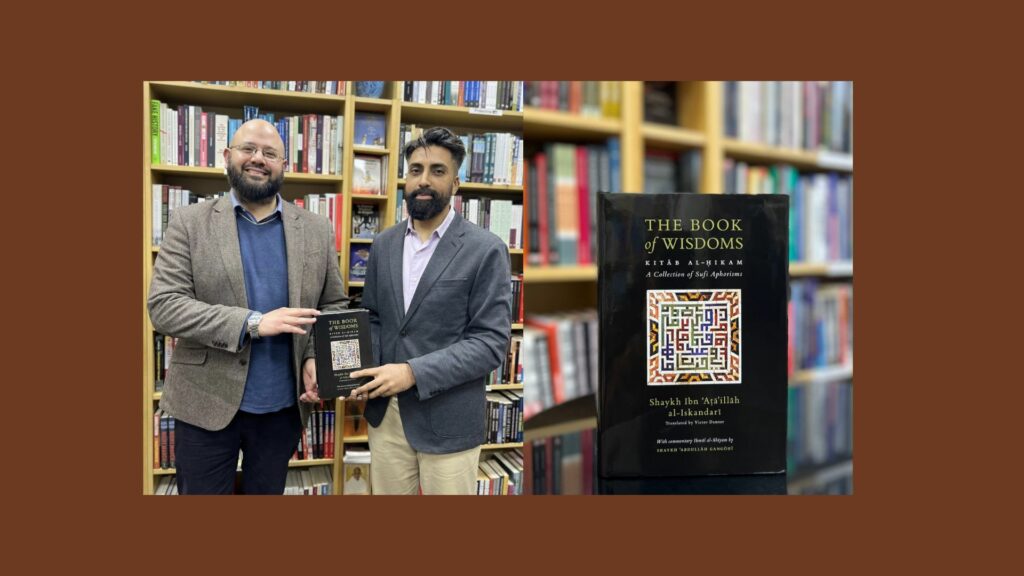On Friday 3rd February 2023, IHRC hosted an author evening with Andrew Booso on his book, The Book of Wisdoms: Kitab al Hikam, A Collection of Sufi Aphorisms. The event was hosted by Syed Talha Ahsan, hosted of the Abbasid History podcast which is sponsored by the IHRC.
Purchase from The Book of Wisdoms the IHRC Bookshop
WATCH THE AUTHOR EVENING:
The conversation has been edited for better readability.
Andrew Booso first read an excerpt from the book:
“”One of the signs of relying on one’s own deeds is the loss of hope when a downfall occurs”
In every single act the Reliance of those who are experientially aware of Allah, Aarifi, Sila Aarif, the gnostic, is only on Allah’s time. They do not rely on their spiritual States, knowledge and righteous deeds. When these saints of Allah render virtuous deeds, their hopes do not rise. They do not feel they have acquired elevation in the ranks on the account of their pious deeds. The perpetually dwell on the hope of Allah’s mercy. Their gaze is never on their righteous deeds, on the other hand the one who is yet to become an Arif is repose in his confidence of good acts. When he practices virtue his hopes rise and he feels pleased with himself thinking that he has now become deserving of forgiveness and Paradise. Yet when he sins, his hopes diminish. Since his reliance is on his own deeds he labours under the impression that his sins constitute an obstacle in the path of Ultimate Divine Mercy in consequence such a person often abandons righteous deeds and takes to the road of Sin. This is plain stupidity and ignorance. Although righteous actions have been commanded and sins forbidden, they do not constitute the basis of forgiveness by themselves. The basis is solely Allahs mercy. Thus the sinner should not despair. He should advance along the path and turn the gaze of his heart from his deeds, relying solely on the mercy of Allah. The aforementioned explanation should not be misconstrued. It should not mean obstination of regret and repentance after commission of Sin. Regret and repentance our essential. The believer will almost immediately repent however he will not despair of Allah’s mercy. “
Talha: Before we go in to the contents of the book, I think it is worthwhile talking about Al Shatibi and his students…
Andrew Booso: Well the shadiri Tariqa is the house. One of the well renowned Middle Eastern tariqa’s, it’s not so much the case in the Indian subcontinent which have more popular tariqa’s like the Qadhiri’s, the Naqshabandi’s… Where as in the Middle East the Shadiri’s perhaps are one of the most preeminent Tariqa’s and as carl petri mentions in one of his books the Mamluk Sultans it becomes the Major tariqa of that region from Egypt & Syria. So Abdul Hasan as Shadiri is originally from the Maghreb in Morocco and he was also someone who had great spiritual intuition and yearning from a young age because he travels off to the east because he goes searching for a guide, a murshid in-around Mesopotamia and then he returns back and when he returns back he meets the person who becomes his actual shaykh Abdul Salaam ibn Mushish who then instructs him to travel again West when he comes across Mauritania and bases himself there and he then develops a big following there and he then concentrates on teaching spirituality…
Talha: What’s fascinated me about Ibn Ata’illah is that at the beginning he was very suspicious of his tariqa. Let’s talk about his meetings with Al-Mursi and about his life and so on and so forth.
Andrew Booso: Well there’s a background to that isn’t there and it’s not just he comes across Mursi he actually has a dispute with some of Mursi’s students. And this time he’s quite skeptical of the whole Sufi Enterprise that Mursi’s part of. So he has this dispute with the students but being quite fair minded in his person in general he thinks to himself “Well let me meet the person and find out for myself whether he is reasonable or not”. He then attends the majlis or gathering by Mursi and he is incredibly swayed by Mursi’s way of explaining the Union between the outer and the inner and the Sharia and the Haqiqa, the law and the path and he realises that this is a man who is spiritually illuminant. And that inspires him…
Talha: What else do we know about Ibn Ata’illah?
Andrew Booso: The interesting thing about Ibn Ata’illah is that he is such a bonafide external Scholar. He takes it upon himself to be really elaborate on the doctrine of Shadiri & Mursi. Because you have these sayings from Shadiri & Mursi where, for example Shadiri says that “my companions are my books”, he is not really a bonafide faqih as such unfamiliar would the sciences where that’s not his specialty, same with Mursi where has Ibn Ata’Illah is from a different type of background, he is someone, if we are to use our modern understanding, He is a madrasa student, someone from Darul Uloom, whereas really Shadiri & Mursi are spiritualists.
This event will be of interest to those who want to learn about Sufi history,the development of the Islamic spiritualist tradition, and Sufi history and thought.







